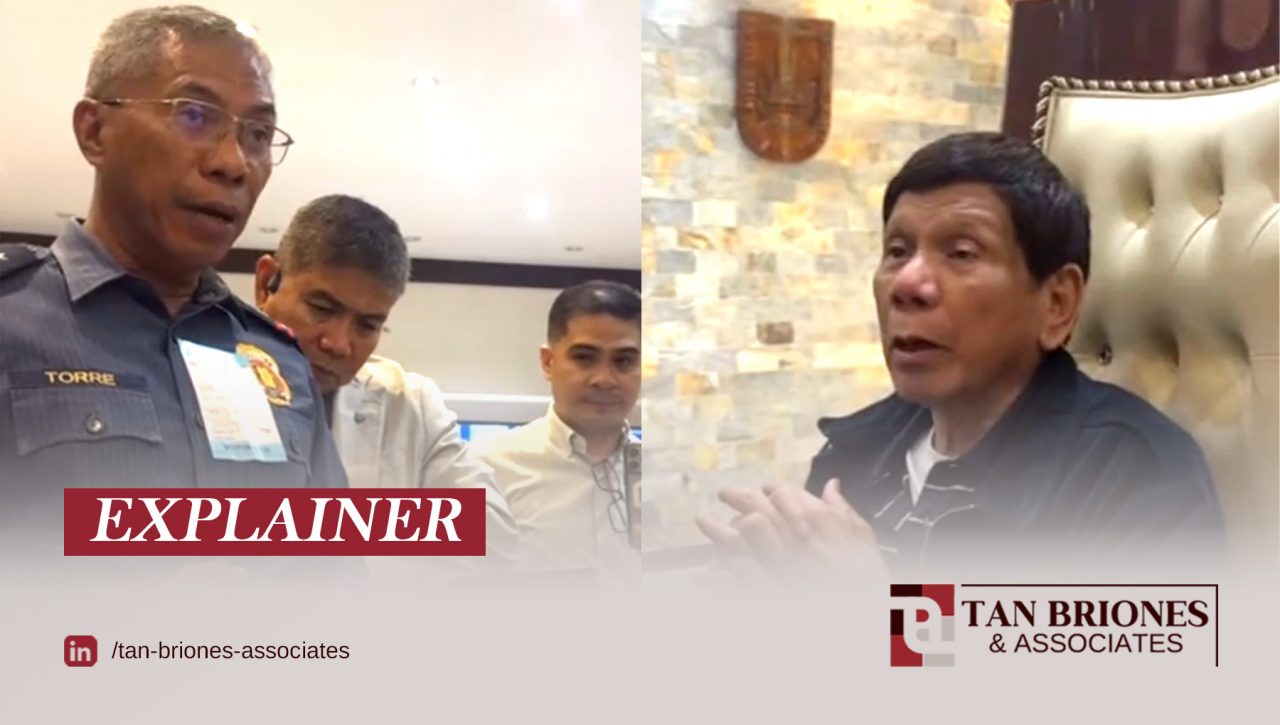
As part of due process, the constitution guarantees the rights of the accused against illegal arrests. Any arrest, to be valid, requires the existence of a valid warrant.
When former President Rodrigo Duterte was arrested at the airport by authorities under a warrant of arrest issued by the International Criminal Court (ICC) for alleged crimes against humanity, there were claims that no warrant was presented despite requests from his lawyers. If the prevailing narratives on social media are to be relied on, it was only at Villamor Airbase, where he was transported, that authorities read Duterte his rights and presented him with an electronic warrant.
Meanwhile, in a Senate hearing, Police Maj. Gen. Nicolas D. Torre III refuted these claims and clarified that a copy of the warrant was provided to his lawyers via digital means during the arrest at the airport. He furthered that the printed version was also later handed to them at the Villamor Airbase. It must be noted that electronic warrants, or e-warrants, are recognized by the courts and used in practice by enforcement agencies in the Philippines.
Supposing that there was indeed a failure to present a warrant, even an electronic one, at the time it was requested by an individual being arrested, does this mean that their due process rights were violated, thereby rendering the arrest illegal?
Warrantless Arrest?
Under Philippine law, there are exceptions that allow for an arrest without warrant. Rule 113, Section 5 of the Revised Rules of Criminal Procedure outlines these exceptions. This includes in flagrante delicto arrests, hot pursuit arrests, and arrests of escapees.
In flagrante delicto pertains to situations where a person is caught in the act of committing a crime, attempting to commit one, or has just committed a crime in the presence of law enforcement officers.
On the other hand, hot pursuit is when a law enforcement officer, based on personal knowledge that a crime has just been committed, immediately follows or chases the suspect to make an arrest.
Lastly, warrantless arrest is allowed when arresting an escapee who has fled from lawful detention or imprisonment after being convicted or temporarily held for an offense.
It is clear that the arrest of the former president does not fall under the three exceptions provided in Section 5 for warrantless arrests. However, the alleged failure to immediately show the warrant at the time of the arrest does not necessarily render the arrest invalid.
Procedural Requirements for Arrests
Section 7, under the same rule, provides that an arresting officer is not required to physically present the warrant at the time of arrest, as long as the officer has knowledge of its issuance. However, if the arrested individual requests to see the warrant, the officer must show it at the earliest reasonable opportunity, or “as soon as practicable”.
Moreover, it requires that the officer must inform the person of: (1) the fact that a warrant has been issued for their arrest, and (2) the nature of the offense they are being arrested for.
Section 7 states: “The person arrested shall be informed of the cause of his arrest and shall be allowed to consult with a lawyer, if he so desires. The warrant of arrest need not be shown to the person arrested, but the officer shall inform him of the fact of the warrant and the offense for which he is being arrested. The officer shall show the warrant of arrest to the person arrested as soon as practicable.”
Based solely on this provision, the arrest of the former president satisfies the procedural requirements under the rules governing the execution of arrests. Even if the warrant was not immediately shown at the airport, what matters is that the warrant genuinely existed at the time of apprehension and was presented later when it became practicable.
In People v. Doria (1999), the Supreme Court ruled that compliance with procedural safeguards in arrests is crucial, but failure to show the warrant immediately does not necessarily render the arrest unlawful if the officer had knowledge of the warrant and properly informed the accused. Furthermore, the court clarified in Pangilinan v. Palisoc (2015) that delayed presentation of the warrant is not fatal as long as the arrested person is informed of the nature of their arrest.
Therefore, there can really be circumstances, aside from warrantless arrests, in which an arrest may be executed without the actual warrant for reasons relating to the exigency of the situation. As long as a valid warrant exists and the arrested individual is informed of the cause for their arrest, the arrest itself is justified within the boundaries of due process.
Setting aside other legal questions, it is reasonable to infer, based solely on procedural aspects, that the alleged failure to present a warrant at the time of Duterte’s arrest does not render it warrantless, but rather warranted.
Follow Tan Briones & Associates on LinkedIn for more legal updates and law-related articles.







